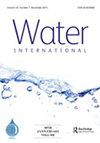开放获取遥感数据用于跨境水管理合作
IF 1.5
4区 环境科学与生态学
Q3 ENGINEERING, CIVIL
引用次数: 0
摘要
开放式遥感产品为跨境水资源管理提供数据。本研究全面概述了这些遥感数据产品在跨界水管理方面的应用、不确定性和影响。我们着眼于跨界合作连续体的不同阶段,描绘了遥感数据在这种合作的不同阶段的潜在作用和应用。尽管存在数据获取、处理和解释方面的不确定性和能力要求,但我们认为,遥感拓宽了监测、评估、预测、跟踪或验证跨界流域依从性的机会,从而挑战了水数据独占性的传统观念。关键词:遥感;跨境水资源管理;水资源冲突;合作水资源管理;本研究由水与发展伙伴计划(DUPC2)[拨款号109345](水核算第二阶段)支持。本文章由计算机程序翻译,如有差异,请以英文原文为准。
Open-access remote sensing data for cooperation in transboundary water management
ABSTRACTOpen-access remote sensing products provide data for transboundary water management. This study presents a comprehensive overview of the applications, uncertainties and implications of these remote sensing data products in the context of transboundary water management. Focusing on different stages within the transboundary cooperation continuum, we delineate the potential role and application of remote sensing data at the various stages of this cooperation. Despite the uncertainties and capacity requirements for data acquisition, processing and interpretation, we argue that remote sensing broadens opportunities to monitor, assess, forecast, track or validate compliance in transboundary basins, thereby challenging traditional notions of water data exclusivity.KEYWORDS: Remote sensingtransboundary water managementwater conflictcooperative water managementwater data sharing Disclosure statementNo potential conflict of interest was reported by the authors.Additional informationFundingThis study was supported by the Water and Development Partnership Programme (DUPC2) [grant number 109345] (Water Accounting Phase 2).
求助全文
通过发布文献求助,成功后即可免费获取论文全文。
去求助
来源期刊

Water International
工程技术-工程:土木
CiteScore
4.40
自引率
7.70%
发文量
58
审稿时长
6-12 weeks
期刊介绍:
Water International is the official journal of the International Water Resources Association (IWRA), founded in 1972 to serve as an international gateway to the people, ideas and networks that are critical to the sustainable management of water resources around the world. Water International''s articles, state-of-the-art reviews, technical notes and other matter are policy-relevant and aimed at communicating in-depth knowledge to a multidisciplinary and international community. Water International publishes both individual contributions and thematic special issues and sections on cutting edge issues.
All individual manuscript submissions are subject to initial appraisal and peer review by the Deputy Editor in Chief and the Associate Editors, and, if found suitable for further consideration, to peer review by at least one independent, anonymous expert referee. All external peer review is double blind. Thematic issues and sections are handled under comparable procedures by guest editors under the oversight of the Editor in Chief.
 求助内容:
求助内容: 应助结果提醒方式:
应助结果提醒方式:


